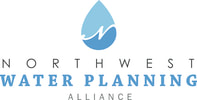|
Drinking water supplies provide an essential service to our communities. Over a century of water use from northern Illinois’ deep sandstone aquifers has led to declining water levels, as more water has been withdrawn than naturally replaced. Population growth and industrial development, as well as climate change will lead to increasing withdrawals from constrained groundwater resources unless action is taken.
To address these water supply issues, the Northwest Water Planning Alliance is currently seeking funding to create a Water Supply Sustainability Plan. The first of its kind for the Chicago region, the Water Supply Sustainability Plan will use newly available ISWS sustainable yield estimates for each water source to develop a regional water supply sustainability goal. Sustainable yield represents how much water can be withdrawn, where and for how long, with acceptable physical, economic, environmental, social, cultural, institutional, and legal consequences. The plan will identify voluntary recommendations to establish a path towards long-term sustainable use of water resources in the NWPA area. The NWPA is seeking to partner with Chicago Metropolitan Agency for Planning (CMAP), Illinois Water Survey (ISWS), and the Illinois-Indiana Sea Grant (IISG) to develop the plan. The partners will help evaluate the potential water savings of different strategies and assess how effective their implementation could be toward meeting the sustainability goal. Building the plan For the Water Supply Sustainability Plan to be successful, involvement and expertise of NWPA members will be a critical component of the planning process. NWPA members would play a vital role in developing and evaluating strategies that can help the area achieve a long-term sustainable water supply. Potential, voluntary strategies will be reviewed and selected by NWPA’s Technical Advisory Committee and members will be called upon to provide information on how specific strategies are currently being used in the NWPA area. Potential recommendations could include active and passive water conservation strategies, such as reducing water loss, metering with volumetric rates, reusing water, as well as retrofitting plumbing and upgrading appliances to water efficient models. The process will engage members in evaluating how a specific strategy can contribute to the overall sustainable water supply goal, and how it can be feasibly implemented by an individual municipality. In addition to working with members, NWPA will enlist water conservation and demand management experts such as the Alliance for Water Efficiency and U.S. EPA WaterSense, to participate in the committee sessions. These experts can help the project team select feasible strategies and set appropriate implementation timelines. With NWPA’s assistance, the Water Supply Sustainability Plan will provide a shared vision and voluntary strategies to promote long-term sustainability of water resources currently being used by NWPA members. It could also be used as a resource for individual municipal plans and could provide a model for other areas of the state. To maintain a sustainable water supply in the NWPA region, we need your help. Join an upcoming NWPA Technical Advisory Committee meeting to get involved. Comments are closed.
|
ABOUTThe latest updates page features posts about issues affecting NWPA member communities and best practices, drawing on interviews and conversations with experts. Archives
July 2024
Categories
All
|
